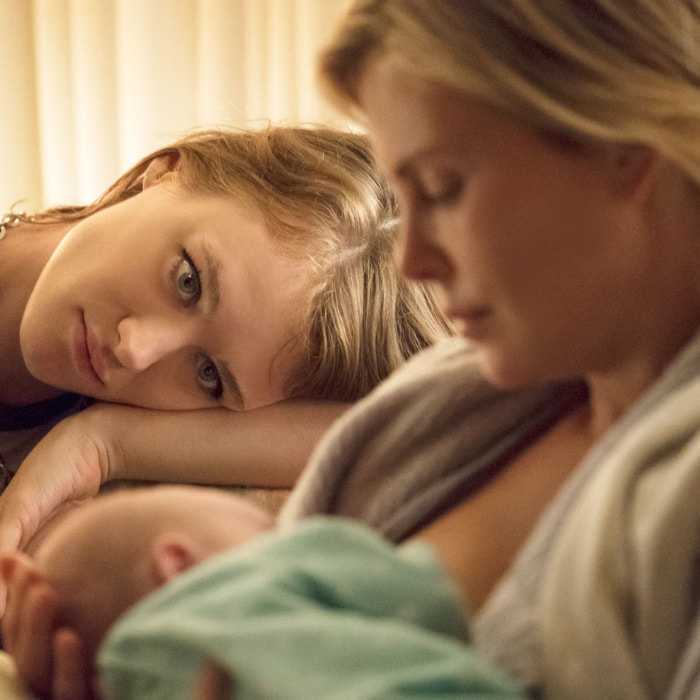This reviewer has long looked askance at the increased role that parenting has occupied in the public discussion. While it’s an undoubted good that the culture doesn’t think that kids just bake in eighteen years of easy childhood and emerge ready-made to contribute to the economy, that focus comes with all the capitalist exploitation inherent to any marketing scheme. Use this product or you’re deliberately putting your child at risk. Teach your kid this many words before they’re two or you’re crippling them for the rest of their intellectual life. Heightened stakes allows for more eyeballs, more ratings, more purchases, and the effect seems to be that the culture has just concocted a new way to judge women. Of course, keeping screen time to a minimum means actively engaging with children, and non-processed food for dinner means finding time to shop and prepare and cook. Theron masterfully plays the physical exhaustion that makes all these proscriptions meaningless.
Tully is the confirmation of this thinking, where strangers feel the need to reinforce the totality of a child’s well-being down to the parts-per-billion over the relief of the mother. The manipulative economic facet collides with an insidious cultural facet that rests on contradictions that are impossible to satisfy. So much information is available that there will always be judgment no matter what decision gets made. Cody has three children herself, and packs the script with slights so viscerally cutting that they wound the viewer, to say nothing of the character uncomfortably toting around a living being inside her and trying to keep the chaos of her life in check without the prying eyes of know-nothing busybodies.
Cody is a wealthy woman, and there’s a version of Tully where she’s unable to imagine what it would be like to raise children without her resources. This is no It’s Complicated, where money is no object and everyone’s comfortably in the 1%, or maybe 5%. With the character of Craig and his wife (Elaine Tan), also parents, Cody is engaging with the way that the rich are able to both seal themselves off from stress and in turn judge people for not providing their kids with personal cooks and live-in nannies. In the film’s telling, it requires a staff to function as a normal human. This is a wholly American film, as Tully’s are just a part of the social structure in several European countries, but here, no such allowances are made. Reitman doesn’t make thrillers, but he dips his toe into the possibility of doing so, as the temperature rises on Marlo with every spill and every wail. He and Theron do a superb job in communicating how necessary the help that Tully provides can be while also allowing for the impossibility of the average person to enlist her services.
Within Marlo’s own home is a resource that she should be able to rely on. Livingston’s Drew is no villain, but he’s oblivious. He can’t imagine what his wife might think when she trudges into their bedroom and he’s playing video games. He doesn’t hear how his benign comment on frozen pizza for dinner could be taken. He is less a husband and father than he is a well-behaved older sibling, taking care of the older kids with no complaints but very much in his own world, a world that takes Marlo for granted. It’s a nuanced depiction of a person ceding the biological ground to the person equipped to feed the baby when she cries, treating the presence of mammary glands as a get-out-of-jail-free card.
The two female performances at the center of Tully root all this contemporary commentary in the most relatable characters that Cody’s ever created. Theron is often a guileless actress with nothing to hide, whether she’s playing a harried mom or a one-armed post-apocalyptic road queen. In addition to the physical work that she did to change her body for the role, which is extensive, she is a person in control of every expression, saying volumes with a subtle turn of her head. As Tully, Davis must be the tangible relief that Marlo is desperate for but she can’t convey a shred of judgment in her taking over of the Moreau home. She does this with a high-wattage charisma that marks the character as nigh-angelic and miraculous. Both characters bonding is made to seem like the most natural thing in the world, female friendship as a curative and a supplement. They provide a model of unvarnished motherhood for the younger and a vicarious window into a rowdier past for the older, forming a believable and bittersweet dyad.
Cody is a person who emerged as someone who lives out loud, and part of that is not caring what people think. Sure, I stripped to pay the bills before I made it big as an Oscar-winning writer, what of it? Tully empathically argues for that kind of ownership, and the taking of a gender’s self-esteem back from Instagram mommies and women’s magazines. Part of that is having the occasional latte, overzealous precautionary principle be damned. Another part is being able to admit when a person needs help, allowing that some people will interpret that as weakness, and damning those people as unfeeling curs unworthy of a single thought. Motherhood is difficult, and combined with economic pressures that push women back into the workplace too soon or demand that fathers make up for ‘lost’ ground with longer hours, benign mistakes have got to be allowed while these dire priorities need patching. Tully is a film that detects these big trends while still being the story of a single person experiencing something that millions of other women must sometimes feel. Reitman and Cody include those sun-dappled gauzy moments of bonding, but they remember those are the outliers built upon mess and noise and bleary eyes. A-

 RSS Feed
RSS Feed